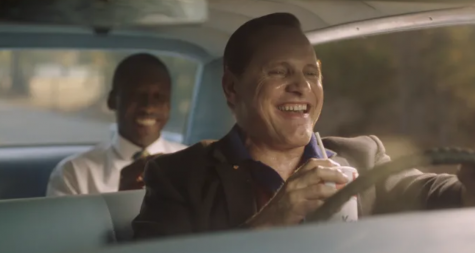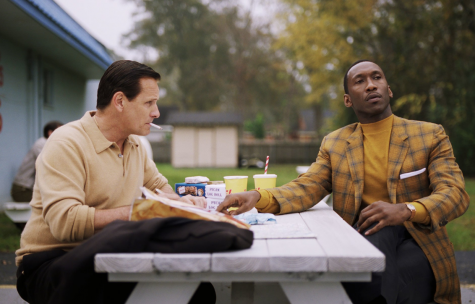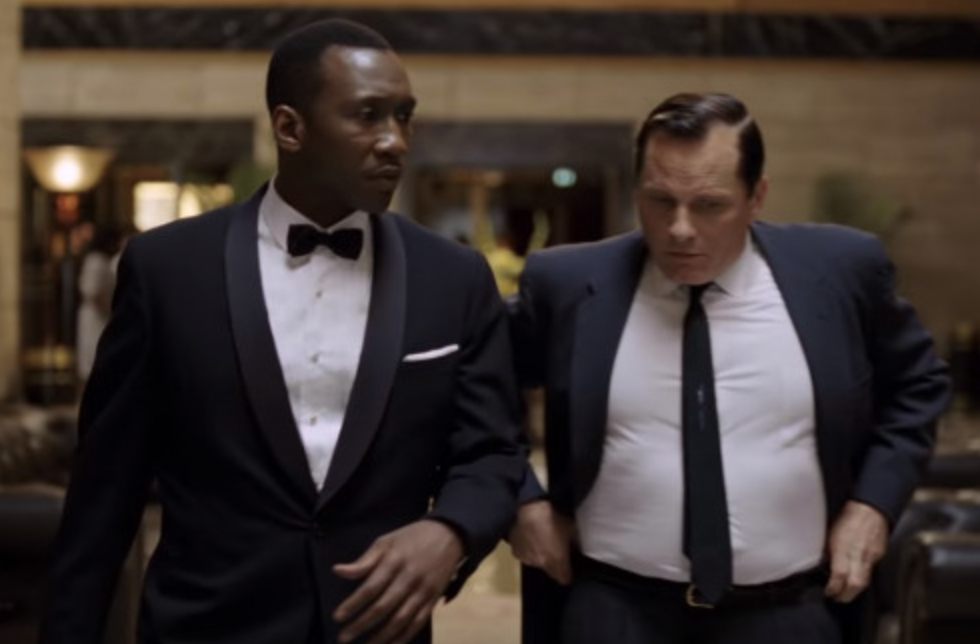Green Book: The Oscar Nominated Masterpiece
February 26, 2019
What’s better than a heartwarming and message-packed story mixed in with a feel-good sense of comedy; the true story of a raw and knotty friendship that develops into an everlasting bond?
“Green Book”, directed by Peter Farrelly, is a masterful new film that highlights how a friendship’s strength can tear down pre-existent racial barriers that dwell in one’s mind. At times, this combat with racism is exemplified subtly, yet at other times it’s very much over.
Moreover, “Green Book” takes the road to demolish racial barriers much further. The director depicts one of the main characters, Dr. Don Shirley, an African-American, as an affluent, highly educated, talented classical pianist. Now think about it: the ideology in the 1960s, when this story took place, was that blacks were none of that; not affluent, not educated and definitely not classical pianists – how dare you, Dr. Shirley!

Tony Vallelonga (Lip), the other component of this friendship is a generic “guido” – a slang term for a masculine and unsophisticated Italian-American man. He prides himself on being the best “bullsh***er in the Bronx”. He works as a bouncer in a nightclub. He’s far from rich and has only a 6th-grade education. His tough “street” attitude juxtaposes Dr. Shirley’s very upper-class way of life, creating disagreements and heated arguments which over time, only nourish the growing bond between them.
At first, the tension between them acts as a hindrance, but as the movie progresses, this contrast becomes less of a cemented barrier when they discover commonalities and use their strengths to help each other. The dissimilarity of their personalities brings a comical, interesting, reflective tone to the movie, and at the end, both characters have become better people.

Their friendship begins as they embark on a concert tour in the racially-plagued Deep South. Dr. Shirley is in need of a driver so he decides to recruit Tony Lip, well-known for his tough street attitude. The interview takes place at Shirley’s prestigious apartment. When Tony sees that Dr. Shirley is black, he instantly foresees problems working for an accomplished black man. First off, because he would be working under him which wasn’t typical, and secondly because Dr. Shirley is a black intellectual traveling through the Deep South, a place “colored” people were brazenly discriminated against. Regardless, he accepts the job, but only because of the paycheck.
When they arrive in the Deep South it is just how Tony Lip predicted it to be. Many problems arise because of Dr. Shirley’s “sinful” pigmentation. In one scene, Dr. Shirley goes out to get a drink at a local (white) bar and is beat up by white bigots. When Tony Lip arrives, the white men have knives and are threatening Dr. Shirley. But Tony utilizes his street knowledge and “bullsh*ts” him and Dr. Shirley out of the situation (as Tony calls it). This scene takes place early in the movie when Tony’s racist views are still roaming in his mind, and he isn’t so keen on risking his life for a black man. This was one of the many racist scenes that illuminate the Deep South’s discriminatory disease.
However, to this day I question whether Dr. Shirley entered oblivious to the resentment that many white people held, or if he knew what he was getting himself into by walking into that white bar that night as a black man, by himself…
The trip starts out with neither of them liking each other, but as the movie and their characters develop, the discomfort between them disappears. When the trip is over, the unthinkable happens: (spoiler alert!)
Tony Lip invites Dr. Shirley to his house for Christmas dinner! This is absurd: A black man in the same house as a white family (the audacity Tony Lip had, to do such a thing!) The turning point for Tony Lip happened as the family ate. One of Tony’s relatives asked how the trip went with the black pianist. Tony said it was good. But then, the relative goes on to make a racist joke about African-Americans. As everyone erupts with laughter, Tony firmly reprimands the out-of-line relative, disgusted at his joke.
It was ostensibly insignificant yet his bravery to challenge the norms showed his change in values and racial views. Yes. He killed the joyous holiday mood as the family exchanged looks at each other, trying to figure out why Tony was being sympathetic to African-Americans, but Tony felt compelled to speak up for his colored friend’s race. His values had ultimately changed. He was no longer closed-minded.

Before this important family interaction, Tony loathed people of color. Before his epiphanic trip through the Deep South with Dr. Shirley, in one early scene, Tony went to the extent of throwing away the drinking glasses two black plumbers used when they worked at his house!
Towards the end of the movie, at Dr. Shirley’s last show, he is not permitted to dine in the restaurant he is performing at. He is told to eat at a restaurant for “his people”. Dr. Shirley concedes to the blatant disrespect. But Tony didn’t. After shoving the white restaurant manager into the wall, breaking it, Dr. Shirley and Tony leave the show. Still nauseated by the racism, they find an African-American restaurant where Dr. Shirley is urged to play the piano by the bartender. Next thing you know, Dr. Shirley is on stage with the band murdering the piano with his talent as the crowd dances and sings.
Even with all the bliss at that restaurant that night, my favorite part was Tony Lip’s smile as he watched his good friend rejoice in the music he was creating. For me, that smile signified a change in his racist views, and that’s all that mattered.
Most movies nowadays depict African-Americans as gangsters or jocks which promotes that lifestyle and is unhealthy for the audience who subconsciously digests them. “Green Book” on the other hand contradicts this prevalent depiction of African-Americans by portraying the main character, Dr. Shirley, as a talented pianist and posh intellectual who has never even eaten the stereotypical African-American food: fried chicken.
The most powerful quote of the movie arises from an argument between them in the car about identity. Dr. Shirley can’t stand it anymore so Tony pulls over and Dr. Shirley races out onto the street in the downpour. Tony apologetically follows him and that’s when Dr. Shirley shouts, “If I’m not black enough, and if I’m not white enough, then tell me something… what am I?” He was not the stereotypical poor and uneducated black individual of the time, nor was he white, even though he played “white man’s music.” On top of this conundrum, he was ultimately lonely. This reflection-triggering question is something we all want to find: our true identity. It relates to some people who oppose their ethnicities for whatever reason but don’t “belong” to other ethnicities at the same time.
Other movies out there don’t encapsulate all these elements, especially at the high level “Green Book” does. I hope this movie intrigues people, inspires the persecuted, and shows how true friendship is something very salient, something that will better the human race through adversity.

Kevin Callahan • Feb 26, 2019 at 9:14 am
Great review, Luca, thanks. Dr. Don Shirley’s life was as amazing as the movie; check it out. He had three doctoral degrees, began learning piano at age 2, was invited to study at the Leningrad Conservatory at age 9, and spoke 8 languages fluently. A great subject for an excellent film, even if it is criticized as a white man’s take on a black man’s world. Oscar Winner Best Film of 2018…